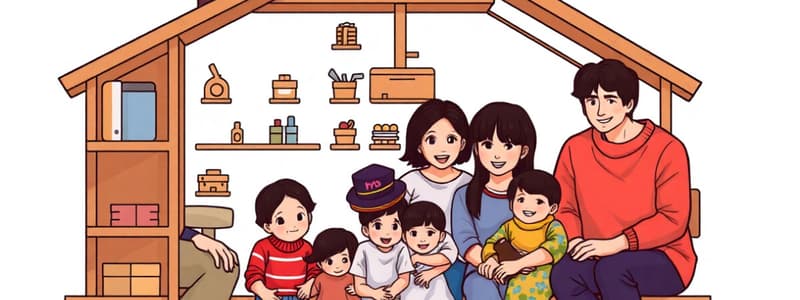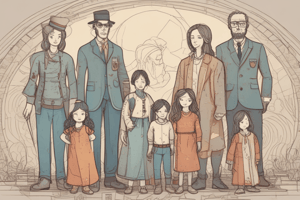Podcast
Questions and Answers
Which family structure includes grandparents, aunts, uncles, and cousins?
Which family structure includes grandparents, aunts, uncles, and cousins?
- Extended family (correct)
- Stepfamily
- Nuclear family
- Single-parent family
What is one of the primary functions of families?
What is one of the primary functions of families?
- Encouraging competition among members
- Facilitating individualism
- Establishing political authority
- Providing economic support (correct)
Which aspect of family dynamics refers to how family members influence each other?
Which aspect of family dynamics refers to how family members influence each other?
- Power dynamics (correct)
- Conflict resolution strategies
- Communication styles
- Social norms
How do families contribute to society?
How do families contribute to society?
What can result from dysfunctional family environments?
What can result from dysfunctional family environments?
What role do families play in the socialization of children?
What role do families play in the socialization of children?
What impacts the health and well-being of family members the most?
What impacts the health and well-being of family members the most?
Which of the following is NOT a type of family structure mentioned?
Which of the following is NOT a type of family structure mentioned?
Flashcards
Nuclear Family
Nuclear Family
A family structure where two parents and their biological or adopted children live together. The most common family type in many societies.
Extended Family
Extended Family
A family structure that includes multiple generations, such as grandparents, aunts, uncles, and cousins, living together.
Family Dynamics
Family Dynamics
The ways in which family members interact with each other, including communication patterns, conflict resolution, and power dynamics.
Cultural Transmission
Cultural Transmission
Signup and view all the flashcards
Socialization
Socialization
Signup and view all the flashcards
Family Impact
Family Impact
Signup and view all the flashcards
Single-Parent Family
Single-Parent Family
Signup and view all the flashcards
Stepfamilies
Stepfamilies
Signup and view all the flashcards
Study Notes
Family Structure
- Family structures are diverse and vary across cultures and time periods.
- Nuclear families (parents and children) are a common structure, but extended families (including grandparents, aunts, uncles, cousins) are also widespread.
- Single-parent families are increasing in many societies.
- Stepfamilies and adopted families represent alternative family structures.
Family Functions
- Families provide care and support for their members, including emotional, social, and physical needs.
- Families transmit cultural values, traditions, and beliefs to the next generation.
- Families play a significant role in socialization, teaching children social norms and expectations.
- Families are often the primary source of economic support for their members.
- Families provide opportunities for intimacy, love, and belonging.
Family Dynamics
- Family dynamics refer to the interaction patterns and relationships within a family unit.
- Power dynamics, communication styles, and conflict resolution strategies are all crucial aspects of a family's internal functioning.
- Family members can have varying levels of influence on one another in the family dynamic.
- Communication styles can vary widely, impacting the health and well-being of the family members.
- Families often experience stress and conflict, creating potential challenges for well-being.
Family and Society
- Families are integral to the functioning of society as a whole.
- They create social support networks, influence social norms, and contribute to economic development.
- Societal changes such as economic pressures and cultural shifts can significantly impact family structures and functions.
- Policymakers often consider the needs of families when creating societal structures and regulations.
- The family unit plays a critical role in passing on culture and traditions from generation to generation.
- The way families function and are structured has a significant influence on the outcomes of individuals.
Family and Individual Wellbeing
- Relationships within a family profoundly influence an individual's emotional and social development.
- Positive family relationships contribute to increased self-esteem, resilience, and social competence.
- Conversely, dysfunctional or challenging family environments can lead to mental health issues and behavioral problems in children and adults.
- Supportive family environments provide a foundation for personal growth and well-being.
- The quality of family relationships and support systems can greatly impact each individual’s overall health and well-being.
Studying That Suits You
Use AI to generate personalized quizzes and flashcards to suit your learning preferences.



